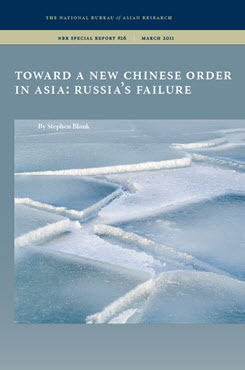NBR Special Report no. 26
Toward a New Chinese Order in Asia
Russia's Failure
Although China’s recent economic and military policies have stimulated arguments about a potential clash with the U.S., this essay contends that China’s most lasting and tangible gains have come at Russia’s expense, both in the Russian Far East (RFE) and in Central Asia.
EXECUTIVE SUMMARY
MAIN ARGUMENT
Russia’s political and economic failure to develop the RFE has undermined its quest for stable great-power status in Asia and its ability to play that role there. As a result, Russia has been forced to turn to China for help. In so doing, it has not only conceded its failure but also allowed China to begin consolidating a new economic and security order in Asia at Russia’s expense, including in the RFE. To the degree that these trends continue along present lines, Russia will become China’s junior partner and supplier of raw materials, not an independent power in Asia.
POLICY IMPLICATIONS
- China is expanding its capabilities to redefine the Asian security system through successful economic and military modernization. These gains, however, have come at Russia’s expense. Moscow’s continuing political and economic failure to develop the RFE jeopardizes its ability to contribute to a durable power equilibrium in Asia.
- Over time, these trends will give China leverage within Russia’s economic and political system, including a new field for economic expansion and reliable energy supplies, and reduce Chinese fears about military competition in the north.
- This long-term process of change in the Asian security order will confront the U.S. and its allies with something resembling a counterbloc comprising Russia and China, if not a strong alliance system, and will add to China’s ability to block U.S. and allied interests. In addition, to the extent that China need not worry about Russian military developments, Beijing will be more free to develop its armed forces in ways that are inimical to the U.S. and its allies.


